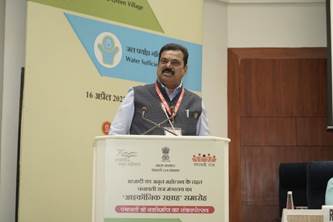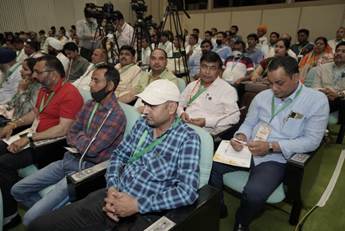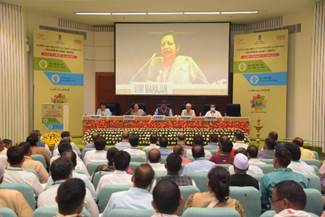New Delhi : “We must bring about positive changes in thinking and mindset to achieve the cherished Sustainable Development Goals (SDGs) that we have adopted and taken up as nine themes. We need to step up responses at grassroots level to make a difference in people’s lives and transform the rural India”, said Shri Kapil Moreshawar Patil, Union Minister of State for Panchayati Raj while addressing the gathering of Panchayat representatives from across the country in the National Conference on Localisation of SDGs organized by the Ministry of Panchayati Raj as part of Iconic Week celebrations to mark Azadi Ka Amrit Mahotsav.
Shri Kapil Moreshwar Patil in his address informed that the United Nations had started the Millennium Development Goals in 2000, after that the Sustainable Development Goals came into existence. He emphasised that we if we want to improve our lifestyle, then we will have to set the SDG targets and work to realize the SDGs as all of the Sustainable Development Goals are important. Union Minister Shri Kapil Moreshwar Patil exhorted Panchayats to fulfil Mahatma Gandhi’s dream of a clean and hygienic India. Shri Kapil Moreshwar Patil made an appeal to the people to participate in the Swachhta drive and take the Swachhta Abhiyan forward with a sense of responsibility towards society and Nation.
On the sixth day of celebration of Iconic Week to commemorate Azadi Ka Amrit Mahotsav, Ministry of Panchayati Raj organized the National Level Conference on Localization of Sustainable Development Goals (LSDGs), focusing on Theme 5: Clean & Green Village and Theme 4: Water Sufficient Village, aligned with broader Sustainable Development Goals.
The Conference was inaugurated by Shri Kapil Moreswar Patil, Union Minister of State for Panchayati Raj by lighting of the lamp along with Shri Sunil Kumar, Secretary, Ministry of Panchayati Raj, Smt. Vini Mahajan, Secretary, Department of Drinking Water & Sanitation, Ministry of Jal Shakti, Dr. Chandra Shekhar Kumar, Additional Secretary, MoPR and Smt. Rekha Yadav, Joint Secretary, MoPR.


Sunil Kumar, Secretary, Ministry of Panchayati Raj emphasised on the importance of cleanliness in the development of villages. He stated that awareness generation on cleanliness is very important and it should be continued among the communities in a saturation mode. He suggested that Elected Representatives should set this goal as utmost priority. He further explained about strategies and action-plan for the optimum utilization of Fifteenth Finance Commission (FFC) grants on clean and green energy. He told that all the 9 themes are inter-connected with each other so, we should focus on each theme accordingly. Thematic videos on water sufficient village of Kuthar Gram Panchayat of Uttarakhand and Metapalli Gram Panchayat of Telangana on the theme of Clean & Green Village were screened.


Smt. Vini Mahajan, Secretary, Department of Drinking Water & Sanitation, Ministry of Jal Shakti shared how India eradicated the open defecation and declared ODF free and is working towards ODF++. She also discussed about Bio-waste energy, Solid-Liquid Waste Management, Grey Water Management etc. She requested Elected Representatives of Panchayats to liquidate or utilize the available funds under Fifteenth Finance Commission, MGNREGA and Swachh Bharat Mission (SBM). She stated that under Jal Jeevan Mission the objective of Ministry of Jal Shakti is to provide clean and potable tap water to every household by 2024.


Taking forward the first Technical Session of the National Conference, Shri Kapil Choudhary, Director (SBM), Department of Drinking Water & Sanitation, Ministry of Jal Shakti explained the importance of cleanliness. Shri Srinivasa, Nodal officer SBM, of Karnataka shared thematic video film of Udupi on solid waste management.
Shri Atul Bagai, Head, Country Office, UNEP, India spoke on importance of clean and green environment at grassroots towards sustainable human development. Prof. Prateek Sharma, Vice Chancellor, TERI School of Advance Study and Dr. Debajit Palit from NTPC School of Management on LSDGs on focusing Sustainable Solution to Renewable Energy issues in the rural context. A thematic video of State-wise video presentation of Gram Panchayats of Ladakh, Tamil Nadu, West Bengal, Himachal Pradesh and Meghalaya were played and Elected Representatives of Panchayats shared their experience as well.
The second Technical Session was chaired by Shri Pankaj Kumar, Secretary, Department of Water Resources, River Development and Ganga Rejuvenation, Ministry of Jal Shakti. Shri Pratul Saxena, Director, MoJS presented his view in water sufficient village. Speakers from WaterAid India and Deepak Parekh Institute also shared their views on LSDGs on focusing Renewable Energy Sufficiency issues in the rural context. States of Rajasthan, Karnataka, Kerala, Maharashtra, Mizoram and Nagaland their experiences, challenges and success stories.

Comments are closed.